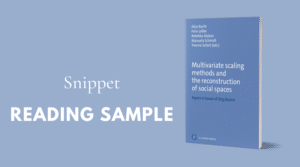5 questions answered by the editors of Blurring Boundaries – ‘Anti-Gender’ Ideology Meets Feminist and Queer Discourses
In your publication Blurring Boundaries you aim to shed light on discursive linkages between political positions known as ‘anti-gender’ and feminist and LGBTIQ+ strands. Could you give us some more insights into your publication?
Our volume aims to understand the extent to which – and why – ‘anti-gender’ claims (that is, claims against such issues as women’s and LGBTIQ+ rights, gender equality, sex education, and gender studies) resonate or even ally with certain strands in feminist and LGBTIQ+ politics. Trans-exclusionary positions are an example of this phenomenon, as they are held not only by ‘anti-gender’ actors, but also by individuals and groups that call themselves feminist. On the other hand, one can find LGBTIQ+ supporters among the ranks of (far-)right groups and political parties, which complicate the picture of a clear-cut divide between progressivism and conservatism. Thus, we focus on the uneasy convergences in today’s social and political landscape.
How did the idea for this publication come about?
We started to think collectively about blurring boundaries as re-articulations of feminisms and gender politics in the context of right-wing mobilizations in Europe at an international workshop at Philipps University of Marburg, in May 2019. In two international conference panels about LGBTIQ+ lives, queer knowledges, and the crusades against ‘gender’ as well as Fake solutions to real problems? Where, how, and why antifeminist discourses work we got further into this issue and found more examples for the phenomenon of blurring boundaries in current political positions and mobilizations. Hence, we decided it was worth a deeper analysis.
The volume contains studies from different – mainly European – countries. Do the discourses studied have structural similarities? Does discursive bridging work in the same way?
The main focus of the book is on a few European settings, indeed: Germany is perhaps the most represented country, but there are interventions that draw inspiration from other contexts such as Ukraine, Spain, Turkey and the United Kingdom. Interestingly, there is a variety of recurring discursive bridges across the book, which have to do with the specific workings of populism and authoritarianism, the (re)naturalization of gender and sexual identities, and conscious strategies of inclusion and exclusion of minority subjects.
How can the findings contribute to a better understanding between the different positions?
When travelling from academia to a wider public, ‘gender’ has become an all-encompassing and contested object. While gender studies and feminist as well as LGBTIQ+ activism increasingly adopted a shifting understanding of gender, ‘anti-gender’ discourses cling to the idea of fixed, binary male and female bodies and identities. This entails that, in the political and social mainstream, ‘real’ women may be political leaders and ‘real’ men may be gay even in the far right. At the same time, some strands of feminism and the LGBTIQ+ community operate with similar ideas. Alongside issues of femonationalism and homonationalism, this is where the differences between both positions blur.
What questions should political science address in relation to gender discourses in the future?
Political science should analyse the functionality and effects of ‘anti-gender’ discourses for far-right, populist, or conservative discourses and politics as well as for some strands of feminist or gay and lesbian activism. The idea of fixed male and female bodies and identities appeals to common sense understandings and thus can be used as a mobilizing force. But this new form of identity politics is exclusionary as it aims at the promotion of the rights of some women and some gays, lesbians, and trans people against others. Also, it is directed against struggles for a liberalization, pluralization, and denormalization of gender relations and thus aims to de-politicize gender.
About the editors of Blurring Boundaries – ‘Anti-Gender’ Ideology Meets Feminist and Queer Discourses
 Dorothee Beck is a research associate at the Department of Political Science at Philipps University Marburg, Germany. Her research interests cover political representation and gender, especially the influence of gender-based violence on political participation, as well as anti-feminism/anti-genderism.
Dorothee Beck is a research associate at the Department of Political Science at Philipps University Marburg, Germany. Her research interests cover political representation and gender, especially the influence of gender-based violence on political participation, as well as anti-feminism/anti-genderism.
 Adriano J. Habed is Lecturer in Gender and Postcolonial Studies at Utrecht University, the Netherlands. His work is at the intersection of queer theory and postcolonial studies, with special interest in how feminist and critical tools can be mobilized against the interests of those same constituencies from which they first emerged.
Adriano J. Habed is Lecturer in Gender and Postcolonial Studies at Utrecht University, the Netherlands. His work is at the intersection of queer theory and postcolonial studies, with special interest in how feminist and critical tools can be mobilized against the interests of those same constituencies from which they first emerged.
 Annette Henninger is a Professor for Politics and Gender Relations at Philipps-University Marburg, Germany. In her work, she focuses on gender policy interventions by women’s movements, LGBTI*Q activism, political parties, and trade unions; on the gender effects of social policies; and on antifeminist mobilizations.
Annette Henninger is a Professor for Politics and Gender Relations at Philipps-University Marburg, Germany. In her work, she focuses on gender policy interventions by women’s movements, LGBTI*Q activism, political parties, and trade unions; on the gender effects of social policies; and on antifeminist mobilizations.
About the book “Blurring Boundaries – ‘Anti-Gender’ Ideology Meets Feminist and Queer Discourses”
‘Gender’ is a catch-all term: it is used in discourses on women’s and LGBTIQ+ rights, gender equality, sexual education, gender studies – and by the anti-gender movements. The book offers an analysis of the blurring boundaries between political positions known as ‘anti-gender’ on the one hand and feminist and LGBTIQ+ strands on the other, starting from the hypothesis that there are discursive bridges between both camps which go beyond the exploitation of emancipatory attitudes. Rather, there are linkages which originate in mainstream feminist and LGBTIQ+ positions. The volume sheds light on these linkages in order to make the case for the need for alliances and dialogues to more effectively counter crusades on women’s and LGBTIQ+ constituencies.
Order “Blurring Boundaries – ‘Anti-Gender’ Ideology Meets Feminist and Queer Discourseses via our web shop (print + e-book)
Blurring Boundaries – ‘Anti-Gender’ Ideology Meets Feminist and LGBTIQ+ Discourses
edited by Dorothee Beck, Adriano José Habed and Annette Henninger
More interviews can be found on our blog.


